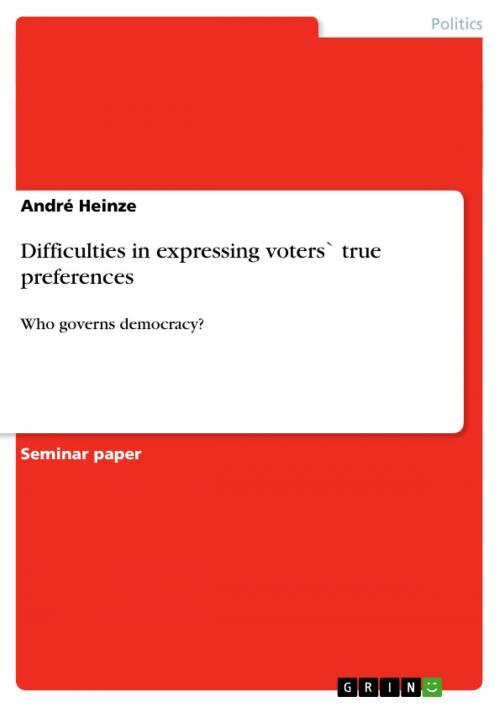Difficulties in expressing voters` true preferences
Who governs democracy?
Nonfiction, Social & Cultural Studies, Political Science| Author: | André Heinze | ISBN: | 9783640185016 |
| Publisher: | GRIN Publishing | Publication: | October 9, 2008 |
| Imprint: | GRIN Publishing | Language: | English |
| Author: | André Heinze |
| ISBN: | 9783640185016 |
| Publisher: | GRIN Publishing |
| Publication: | October 9, 2008 |
| Imprint: | GRIN Publishing |
| Language: | English |
Seminar paper from the year 2006 in the subject Politics - International Politics - Topic: European Union, grade: 1,7, University of Mannheim (Fakultät für Sozialwissenschaften), course: Europäische Demokratien im Vergleich, 23 entries in the bibliography, language: English, abstract: This paper shows that it is quite unlikely that voters are able to express their true preferences sufficiently. In the first part I assume a voter who is aware of his own true preferences. However, the electoral system offers an incentive to vote strategically. In such a situation the voter is aware that he doesn`t express what he favours most, but what he thinks he can support without wasting his vote. I will show that it is possible to limit the incentive for voting strategically either by the choice of the electoral system or by the abolishment of polls. The second part shows first that it is quite unlikely that a voter is able to identify his true preferences, either because of Hume`s problem of Induction or because of complexity. Complexity is enhanced when Media comes into the game, because voters have to consider both the argument and those who created the argument. Therefore it is necessary to show, that Media has an incentive to collude. If one assumes Media to collude it doesn`t explain why voters` preferences are shaped. Preferences are shaped either due to media`s creation of mutual beliefs or by persuasion. Persuasion refers to complexity, because it is rather difficult to consider additionally the interests of those who created a certain media product. However, votes are expressed and aggregated. But whose or what preferences are that?
Seminar paper from the year 2006 in the subject Politics - International Politics - Topic: European Union, grade: 1,7, University of Mannheim (Fakultät für Sozialwissenschaften), course: Europäische Demokratien im Vergleich, 23 entries in the bibliography, language: English, abstract: This paper shows that it is quite unlikely that voters are able to express their true preferences sufficiently. In the first part I assume a voter who is aware of his own true preferences. However, the electoral system offers an incentive to vote strategically. In such a situation the voter is aware that he doesn`t express what he favours most, but what he thinks he can support without wasting his vote. I will show that it is possible to limit the incentive for voting strategically either by the choice of the electoral system or by the abolishment of polls. The second part shows first that it is quite unlikely that a voter is able to identify his true preferences, either because of Hume`s problem of Induction or because of complexity. Complexity is enhanced when Media comes into the game, because voters have to consider both the argument and those who created the argument. Therefore it is necessary to show, that Media has an incentive to collude. If one assumes Media to collude it doesn`t explain why voters` preferences are shaped. Preferences are shaped either due to media`s creation of mutual beliefs or by persuasion. Persuasion refers to complexity, because it is rather difficult to consider additionally the interests of those who created a certain media product. However, votes are expressed and aggregated. But whose or what preferences are that?















